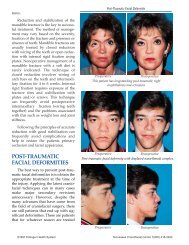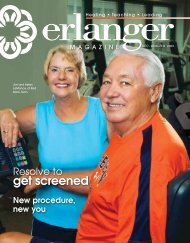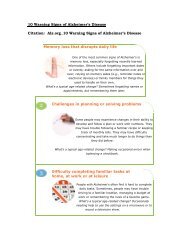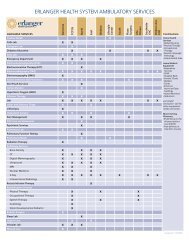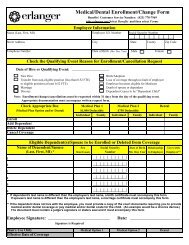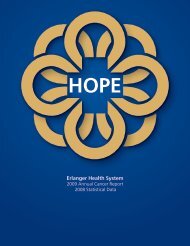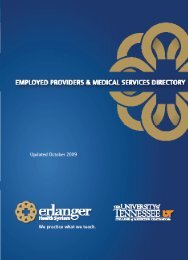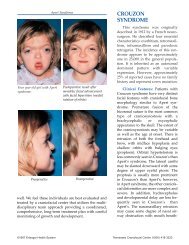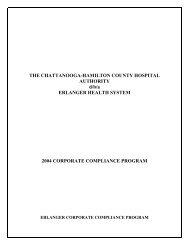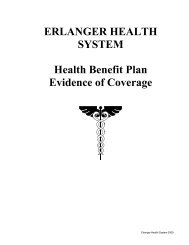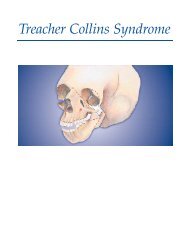2011 Cancer Committee Members - Erlanger Health System
2011 Cancer Committee Members - Erlanger Health System
2011 Cancer Committee Members - Erlanger Health System
Create successful ePaper yourself
Turn your PDF publications into a flip-book with our unique Google optimized e-Paper software.
Adult Oncology<br />
The <strong>Erlanger</strong> <strong>Health</strong> <strong>System</strong> has been accredited by<br />
the American College of Surgeons’ (ACoS) Commission<br />
on <strong>Cancer</strong> (CoC) as a Teaching Hospital<br />
<strong>Cancer</strong> Program since 1981. This accreditation is<br />
granted only to facilities that voluntarily commit to<br />
provide the best in cancer diagnosis and treatment,<br />
and comply with the established CoC standards.<br />
Each cancer program must undergo a rigorous evaluation<br />
and review of its performance and compliance<br />
with the CoC standards. To maintain accreditation,<br />
facilities with accredited cancer programs<br />
must undergo an on-site review every 3 years.<br />
The Accreditations Program is concerned with prevention,<br />
early diagnosis, pretreatment evaluation,<br />
staging, optimal treatment and rehabilitation, surveillance<br />
for recurrent disease, support services, and<br />
end-of-life care.<br />
Obtaining care from a CoC-accredited cancer<br />
program ensures that one will receive the<br />
following:<br />
Quality care close to home<br />
Comprehensive care offering a range of state-ofthe-art<br />
services and equipment<br />
A multi-disciplinary, team approach to coordinate<br />
the best cancer treatment options available,<br />
utilizing national treatment guidelines —National<br />
Comprehensive <strong>Cancer</strong> Network (NCCN)<br />
Access to cancer related information, education<br />
and support<br />
A cancer registry that collects data on cancer type,<br />
stage, treatment results and offers lifelong patient<br />
follow up<br />
Ongoing monitoring and improvement of care<br />
Information about clinical trials and new<br />
treatment options<br />
Five key elements to the success of a<br />
Commission on <strong>Cancer</strong> accredited cancer<br />
program:<br />
The clinical services provide state-of-the-art<br />
pretreatment evaluation, staging, treatment, and<br />
clinical follow-up for cancer patients seen at the<br />
facility for primary, secondary, tertiary, or end-oflife<br />
care.<br />
The cancer committee/leadership body leads<br />
the program through setting goals, monitoring<br />
activity, and evaluating patient outcomes and<br />
improving care.<br />
The cancer conferences provide a forum for patient<br />
consultation and contribute to physician education.<br />
The quality improvement program is the<br />
mechanism for evaluating and improving<br />
patient outcomes.<br />
The cancer registry and database is the basis for<br />
monitoring the quality of care.<br />
Recognizing that cancer is a complex group of<br />
diseases, the CoC’s cancer program standards promote<br />
pre-treatment consultation among surgeons,<br />
medical and radiation oncologists, diagnostic radiologists,<br />
pathologists, and other cancer specialties.<br />
This multi-disciplinary cooperation results in improved<br />
patient care.<br />
2<br />
Adult Oncology



